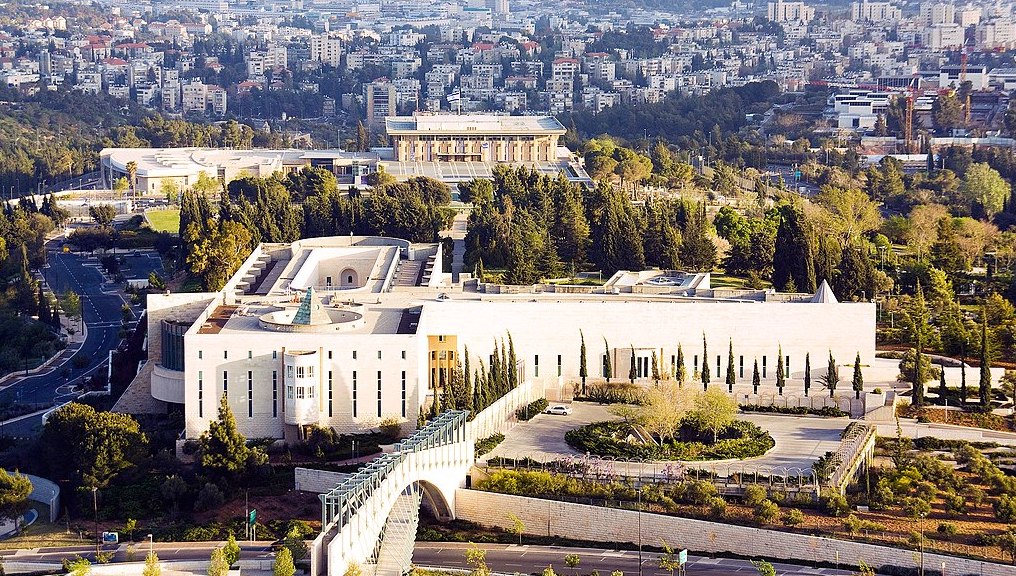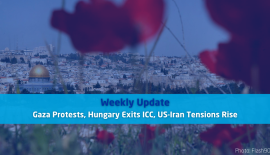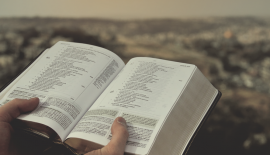A time of terrible tension
Israel is going through a very hard time. The Judicial Reform that was first introduced by the government seven months ago has created a huge storm of protest and dissension both in the Knesset and on the streets. On Monday, the first law connected to that reform passed in the Knesset. It was much more limited than originally conceived and was the least controversial of all the legislation originally proposed. And yet, in the days leading up to the Knesset vote and just after the vote, massive demonstrations spun out of control. And while tempers are flaring, the overwhelming feeling in the country today is one of profound sadness. How did we get to this point?
It has been fairly clear from the beginning that the judicial reform has been the catalyst, but the underlying reasons for the tensions have been brewing for some time. The reform itself seeks to redress an imbalance between the Knesset and Government of Israel on one side and the Supreme Court on the other, an imbalance that was first created by the Supreme Court itself in a series of otherwise unremarkable decisions by Aharon Barak and some of his colleagues on the bench.
Many will argue that the initial blow to the delicate checks and balances so important for any democracy was struck then, by judges who are not elected and who have no accountability to the public. Others claim that the idea of judicial review is key to any democracy and the only way to ensure that corrupt politicians don’t run ramshackle over the law. We all agree that the people deserve protection against corruption and unreasonable decisions, by either the courts or the government. The question is, who should be the arbiter of that final stand of reasonableness.
Israel is probably one of the strongest democracies on the planet and the crazy demonstrations that we have witnessed recently are a testament to that. There is total freedom of expression here and these new laws do not challenge that in any way. However, there is a real problem in our country. We are a country made up of one people who have been dispersed around the globe for nearly 2,000 years. When we returned to the Land, we were united in our love for the land and a huge sense of solidarity within our people. But there are very basic values that separate us as well. Some are devout in their faith but refuse to share the civil duties of the nation. Others are just as devout but are also involved in every facet of life, including the military, the work force and the settlement movement. Others are totally secular but are brave fighters in the IDF. But most of the country is a combination of secular and devout, traditional in their religious outlook, secular in their behavior, devoted to the country but politically centrist.
There are a number of issues facing the Israeli public today that are very controversial. One is the question of the ultra-Orthodox or Haredi population, a devout group of Jews who shun military service, participate in the work force in very small numbers and refuse to include basic secular education in their school system. Because of the political system in Israel, they have managed to retain these positions despite their obvious lack of equality before the law — their young men don’t serve in the IDF when everyone else does, their children are not given basic education when other children are. And the Supreme Court has repeatedly struck down laws that cement this inherent sense of inequality and unfairness. And rightfully so.
And this, perhaps more than any other issue, lies at the crux of the anger that has permeated our country. As part of the recent demonstrations, IDF officers, particularly fighter pilots, have announced they will no longer serve in the Reserves if these laws pass. This is a red line that has never been crossed and that is enormously dangerous to our country. However, the coalition government that is trying to pass this judicial reform is also using the reform to protect the Haredi population’s refusal to serve. So it becomes problematic for coalition members to accuse the protesters of crossing a red line when they refuse to serve, if they are defending an entire population’s right not to serve.
This is just one example of the underlying issues surrounding the judicial reform, but one that highlights the resentments and passions that are fueling the protests. One other main issue though, is Netanyahu himself. While all recognize that he is a very talented leader and has done so much for Israel over the years, he has made serious enemies as well. And not only amongst those who are his ideological opponents. He has alienated many from his own party over the years, consistently pushing aside any Likud politician or potential politician who threatened his dominance of the party. Some of these are today the leaders of rival parties who are the most vocal in their opposition to the government’s policies.
But there is also the issue of the trial against Netanyahu on charges of corruption. Many in the country are convinced that he is guilty and it has not helped that the media has been overwhelmingly biased against Netanyahu in this matter. But given that, Netanyahu’s handling of the situation has not been wise and has served to deepen the resentment against him.
Tonight we will begin the fast the 9th of Av, commemorating the destruction of the Second Temple in Jerusalem by the Romans in the year 70. Jewish history teaches us that it was infighting within the Jewish people of the time that enabled the Romans to seize Jerusalem. That infighting began years earlier, but culminated in the destruction of the food stockpiles by Jewish extremists, trying to prevent other Jews from taking a different approach to the Romans.
There is an overwhelming sense of sadness in Israel today and grave fear that we are facing a similar situation in our 75th year of independence. But there is one thing we do have – despite the anger against the politicians, and the venom that is often present in the media, there is genuine solidarity among our people. Strangers will help strangers and no one asks how they feel about judicial reform. That is our strongest weapon. But all the same, the existing tension, even anarchy at times, is dangerous and disturbing. Regardless of where we all stand on judicial reform, this is the time for a break. A break that will be utilized for real conversation about the issues that divide us. I hope and pray that our leaders, on both sides of the aisle, have the wisdom to reach out to their opponents and talk. Really talk. This is what we need today.






